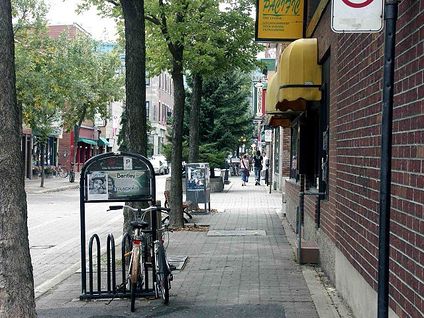mNo edit summary |
(→Initiatives by topic: cycling) |
||
| Line 1: | Line 1: | ||
{{Quebecnews}}[[File:Rue Duluth, Montréal.jpg|left|424px]]<br clear=left> | {{Quebecnews}}[[File:Rue Duluth, Montréal.jpg|left|424px]]<br clear=left> | ||
== Initiatives by topic == | == Initiatives by topic == | ||
=== Cycling activism === | |||
[https://montreal.bixi.com/ Bixi Montreal] - [http://www.velo.qc.ca/en/Home Vélo Québec], non-profit organization, which encourages the use of bicycles - whether for recreation, tourism or as a clean, active mode of transportation - in order to improve the environment, [[health]] and [[wellbeing]] of citizens. | |||
=== Food activism === | === Food activism === | ||
Revision as of 08:49, 27 November 2015

Initiatives by topic
Cycling activism
Bixi Montreal - Vélo Québec, non-profit organization, which encourages the use of bicycles - whether for recreation, tourism or as a clean, active mode of transportation - in order to improve the environment, health and wellbeing of citizens.
Food activism
Le Potager enchanté, organic vegetable farm on a human scale
Sharing
La Remise, Montreal
Towards sustainable economies
Worker-owned forestry enterprises in the North, paramedic coops and the sheer number of worker-owners place Québec in the company of other coop strongholds like the Basque region of Spain and Emilia-Romagna in Northern Italy. In fact, there are over 7,000 coops and nonprofit businesses in Quebec employing over 150,000 people and generating over $17 billion in sales. [1]
Chantier de l'économie sociale
The definition of Social Economy used by the Chantier de l'économie sociale in Quebec follows: The Social Economy is made up of association-based economic activities founded on values of:
- Service to members or the community rather than only generating profits and seeking financial returns;
- Autonomous management (not government controlled);
- Democratic decision making;
- Primacy of persons and work over capital;
- Based on principles of participation, empowerment and individual and collective responsibility.
The Social Economy includes:
- social assets (housing, childcare centres, etc.) of community organizations;
- social enterprises including co- operatives and revenue-generating programs of non profit groups;
- credit unions and social financing organizations like community loan funds;
- training and skills development enterprises; and
- sectoral and regional organizations e.g. renewal energy associations. W
Resources
- Helios Makerspace, non-profit workshop in Montreal
Interwiki links
Wikipedia: Quebec, Quebec, Energy, Quebec, Environmental and energy policy
External links
References Template:Attrib sca ref